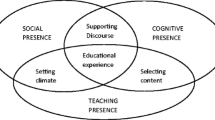Abstract
The use of information technology to enhance teaching and learning processes has been practiced for a number of years now. However, the rapid growth in the use of the Internet has led to a new dimension in interactive and collaborative learning anytime and anyplace dynamically. With the explosion of “virtual education initiatives”, the question of the feasibility and success criteria for such projects quickly arises. To address the question in an organized way, we propose a project assessment based on critical success factors. Hence, in this article, we draw on a widely recognized critical success factor framework. We (slightly) adjust the framework to fit the special characteristics of virtual education initiatives, and apply to one case study, namely the virtual education initiative at the Faculty of Business at the City University of Hong Kong. The results suggest that the past success of the case is due to the adherence to the large majority of critical success factors. However, it also outlines some areas of concern. The paper concludes with a discussion on the strength and limitations of virtual learning environment as well as future directions.
Similar content being viewed by others
Explore related subjects
Discover the latest articles, news and stories from top researchers in related subjects.References
Bergeron and Raymond, The advantages of electronic data interchange, Database 23(4) (Fall 1992) 19–31.
W.H. DeLone and E.R. McLean, Information systems success: The quest for the dependent variable, Information Systems Research 3(1) (1992) 60–95.
R. Grohowski, C. McGoff, D. Vogel, B. Martz and J. Nunamaker, Implementing electronic meeting systems at IBM: Lessons learned and success factors, MIS Quarterly (December 1990) 368–383.
D. Johnson and R. Johnson, Learning Together and Alone: Cooperation, Competition, and Individualization (Prentice Hall, Englewood Cliffs, NJ, 1975).
S. Kagan, Cooperative Learning, Resources for Teachers (Inc., San Juan Capistrano, CA, 1994).
D.E. Leidner and J.J. Elam, Executive information systems: Their impact on executive decision making, Journal of Management Information Systems (Fall/Winter 1993-1994) 139–156.
H. Mintzberg, The Nature of Managerial Work (Harper & Row, 1973).
J. Nunamaker, A. Dennis, J. Valacich, D. Vogel and J. George, Electronic meeting systems to support group work, Communications of the ACM 34(7) (July 1991) 40–61.
J.F. Rockart, Chief executives define their own data needs, Harvard Business Review (March/April 1979) 81–92.
J.F. Rockart and D.W. DeLong, Executive Support Systems: The Emergence of Top Management Computer Use (Dow-Jones Irwin, 1988).
J. Watson, Reflection through Interaction: The Classroom Experience of Pupils with Learning Difficulties (The Falmer Press, London, 1996).
Author information
Authors and Affiliations
Rights and permissions
About this article
Cite this article
Ma, L., Vogel, D. & Wagner, C. Will virtual education initiatives succeed?. Information Technology and Management 1, 209–227 (2000). https://doi.org/10.1023/A:1019177109389
Issue Date:
DOI: https://doi.org/10.1023/A:1019177109389




